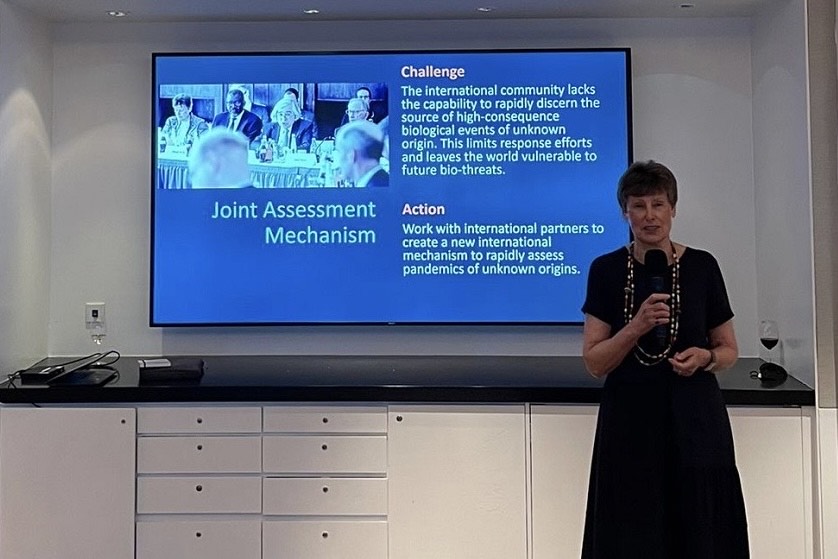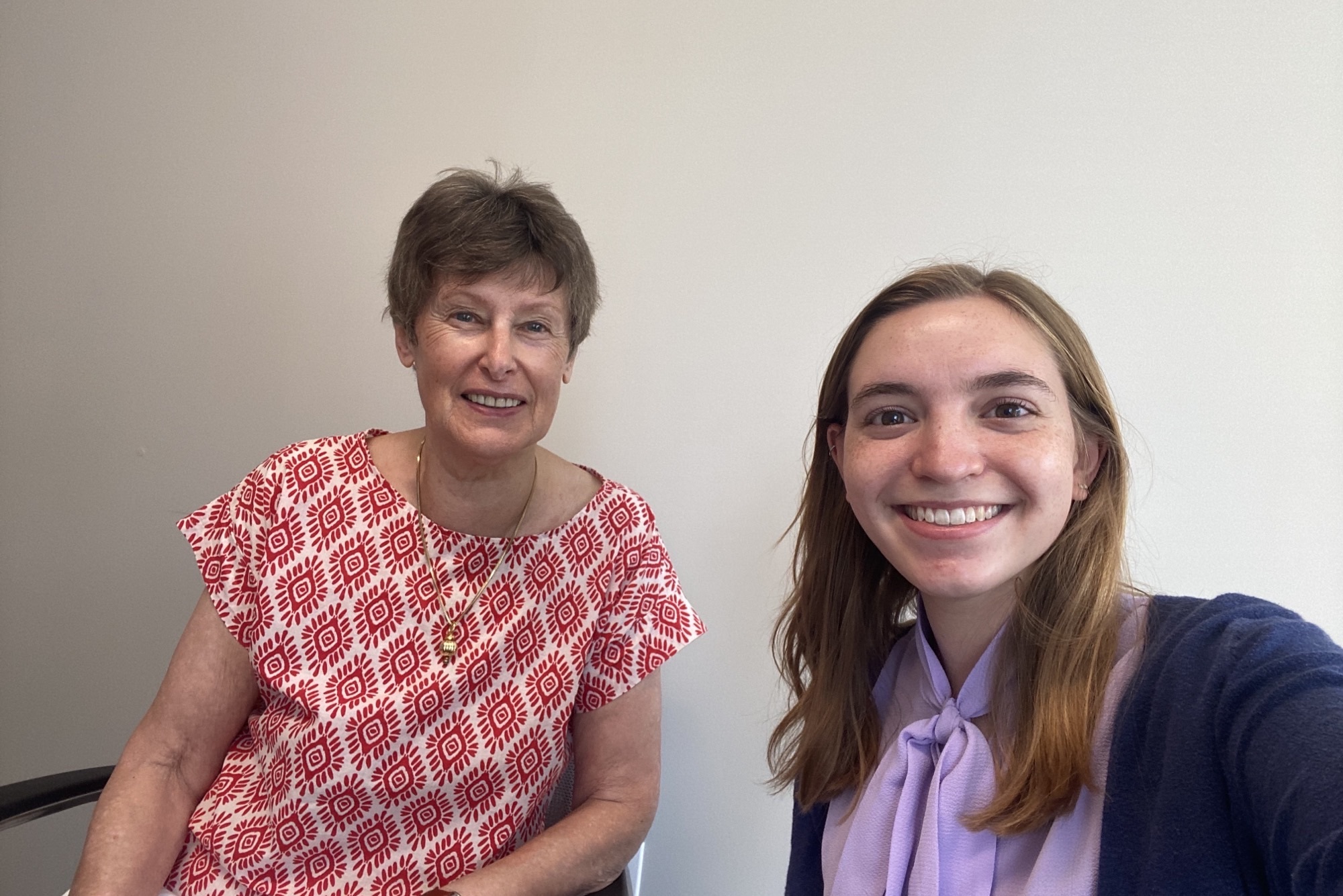
Maggie Thomas
Former Intern, NTI
Atomic Pulse
Angela Kane spent over 35 years working for the United Nations (UN) and her last positions were Assistant Secretary-General for Political Affairs, Under-Secretary-General for Management, and High Representative for Disarmament. She has spent the past year working at NTI as the Sam Nunn Distinguished Fellow, supporting NTI’s work on global threat reduction with a particular focus on NTI | bio’s initiatives to reduce global catastrophic biological risks. Maggie Thomas, NTI’s communications intern, had the opportunity to speak with Kane about her work.
You joined NTI after a long, impressive career at the UN. What brought you to the UN in the first place?
I was in New York, and as a German national I didn’t have a work visa. I had to work either for the United Nations or for one of the permanent missions to the UN, because you didn’t need a visa to work there. My English is very good, and the recruitment office asked me to take a test to be a writer/editor. I had studied political science and economics, so did I want to be an editor/writer? No, but I sat behind a desk within two weeks.
Within less than a year, I was recruited by the Office of the Secretary-General. I really had a wonderful experience. I was at the lowest professional level at the UN, but people started recognizing me because I worked with the Secretary-General. Even though I didn’t want to have a career at the UN originally, working at the UN was such fascinating work. You can make changes; you can move the needle a little bit. And I found that it was very satisfying. Plus, it was a great team of people to work with.
What led you to NTI?
Once I retired, I discovered that I really missed work. I got invited by NTI to participate in a tabletop exercise about reducing global catastrophic biological risks hosted at the Munich Security Conference in 2020. We started discussing the idea of what we now refer to as the Joint Assessment Mechanism to determine outbreaks of unknown origin. I came to NTI to further this project. What I like most about NTI is that the organization doesn’t just provide academic resources or thoughts; NTI experts lead initiatives that they want to bring into action. NTI is making a real contribution to building a safer world. That purpose is very important to NTI, and I like that.
You recently went to Singapore for the 2022 Global Health Security Conference with the NTI | bio team. How was that?
It was a fantastic experience. We had a such a good mutual support system. If one of the NTI | bio colleagues gave a presentation, we would all take pictures and tweet about it immediately. I felt very supported because we were all looking out for each other. This was a very large conference and there were so many events that were happening at the same time. There was really high participation in the meetings that NTI organized and it made me very proud that NTI had a program to offer that was interesting for the experts.
It is also nice to be back attending conferences and events in person. There are opportunities to make personal connections and have serendipitous encounters you can’t replicate in an offline or in a virtual setting. For example, I ended up meeting the Australian ambassador at this conference because we were both looking for the entrance to the conference center on the first day of the event. It was a large space! That encounter led to another meeting that I had separately with him on a bilateral basis to inform him about the Joint Assessment Mechanism.
That’s so funny, I never thought about meeting people at conferences like that. Did you present the Joint Assessment Mechanism at the conference?
I did.
Could you talk a little bit about that?
Let me start by posing this question: When you have an outbreak of some disease or virus, whatever it may be, how do you go about knowing what it actually is? The World Health Organization has a mechanism to investigate natural outbreaks and UN Secretary-General has the authority to investigate the alleged use of biological weapons – but there is a gap in the international community’s ability to rapidly assess the source of biological events. The Joint Assessment Mechanism that NTI is proposing would be housed within the UN Secretary-General’s office and have the ability to assess situations of ambiguity when it is unclear if a biological event emerged naturally or was the result of a deliberate or accidental release.
Last year, the UN Secretary-General issued a report called “Our Common Agenda,” which focused a lot on pandemic preparedness. The report made a very strong pitch that we need to prepare our world much better for any potential outbreaks. I think the Joint Assessment Mechanism fits exactly into that niche and I hope it will be taken forward.
Do you think your experience at the UN has helped you with progressing the Joint Assessment Mechanism?
My experience is helpful because part of developing an initiative like the Joint Assessment Mechanism is making connections and talking to people, informing about it, asking for feedback and socializing the idea. This is something that you can’t really do on Zoom meetings or on the telephone because diplomacy is conducted with people, face-to-face. Good connections and trust are important to go forward in diplomacy. For example, I have personally been able to recruit ambassadors to join our working groups to progress the Joint Assessment Mechanism. That’s not an easy thing to do because much of this work is done at working levels, but I’m happy to use my experience and connections to further this project. Just next week, Jaime Yassif and I will be making a presentation on the Joint Assessment Mechanism to all the members of the European Union; I am very happy that they agreed to engage with us on the Mechanism.
Let me also mention another aspect that is important: media outreach. We have published a blog on the European Leadership Network website. We also had an article in the July/August issue of Arms Control today which was widely distributed; this article is being re-published on a UN-focused publication called PassBlue and some other articles are under preparation. So we are getting the word out!
Have you worked with any other teams or projects at NTI?
At the Global Health Security Conference in Singapore, I participated in NTI | bio meetings on the International Biosecurity and Biosafety Initiative for Science (IBBIS). I have also been engaging with the Global Partnership Against the Spread of Weapons and Materials of Mass Destruction in my NTI capacity. This year, the work of the Global Partnership was very much focused on the war in Ukraine—in particular, the accusations that have come from Russia about possible bio weapons labs. It’s been very interesting to get a handle on what they’re doing and how NTI can contribute. I’ve also engaged with the Global Partnership Africa Signature Initiative and will be attending the Global Partnership meeting this fall with NTI colleagues to present on the Joint Assessment Mechanism and the Global Health Security Index.
It sounds like you’ve been really busy with the Joint Assessment Mechanism and everything else.
I have!
Are there any highlights of your experience at NTI that you’d like to share?
I was able to participate in NTI’s 20th Anniversary celebration. It is such a big milestone. And even though the milestone was celebrated a little bit past the anniversary date because of COVID-19, I thought it was just a wonderful official event, with so many tributes to Senator Nunn, Secretary Moniz and the whole team at NTI. It was such an honor to be part of the team. Subsequently, there was a reception on the roof for all staff to celebrate the anniversary and it contributed to my sense of cohesion and to my sense of becoming part of the culture at NTI.
And how have you enjoyed living in Washington, D.C.?
I went to graduate school here, but I really hadn’t been been back that much. I had forgotten how pretty this city is. It’s really beautiful. There are really nice stately houses and beautiful gardens. In the spring, azaleas are blooming, and everything is just so gorgeous.
We have friends here too, so it’s been nice to be able to get together with them for dinner and outings. It’s been really fun.
What’s next for you?
My time as the Sam Nunn Distinguished Fellow is ending, but I will continue to work with NTI in a different capacity. I do feel ownership of this journey. I would like the Joint Assessment Mechanism to succeed; it really needs to have more work, more consultations, more advocacy. And I’m happy to use my connections to do that. Ultimately, I’d like to see it established.
Kane will be speaking about the Joint Assessment Mechanism during a side event of the Nuclear Non-Proliferation Treaty Review Conference on August 11, 2022. Click here for details.
Sign up for our newsletter to get the latest on nuclear and biological threats.
Gigi Murakami is an American freelance illustrator and manga (comic) creator based in Brooklyn, New York. Her work blends Japanese manga art and vintage American comic and pulp aesthetics.
Eugenia Zoloto is a Ukrainian artist who specializes in paper cutting, collages, and illustrations, in addition to working with oil paints and mixed mediums. She lives in Kyiv with her husband and two children and is participating in the 2023 #CranesForOurFuture campaign by contributing a beautiful floral sculpture featuring an origami crane.
Considering the current nuclear landscape, the power of Christopher Nolan’s film and the moral and ethical questions raised by J. Robert Oppenheimer’s work, movie viewers may be motivated to act to advocate for a world without nuclear weapons. But how?




